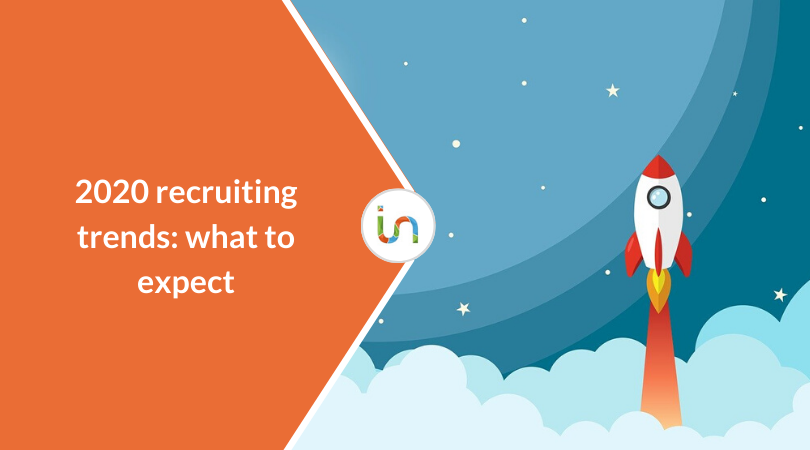
Recruiting trends: what HR should expect from 2020
2020 is not only a leap year, but also the year that opens a new decade. That’s why many of the trends that will affect the HR world will not be limited only to these 12 months, but will be destined to profoundly change the way of interpreting and living the recruitment.
Some trends are already underway, others will soon arrive and gradually invest all the Human Resources. Between chatbots, HR Analytics, centrality of the Candidate Experience, Artificial Intelligence, as well as Employer Branding increasingly protagonist, let’s see in this article what we should expect in the coming months from both the point of view of cultural change and the tech one.
The corporate culture increasingly protagonist
Let’s start with… the corporate culture. It is one of the trends of 2020 regarding recruitment, to which it is closely connected. Some companies, not all, will have to reverse course and no longer consider employee engagement as a secondary factor. Indeed, this aspect will become more decisive to strengthen the concept of corporate culture that will be a tool also for Talent Acquisition. In particular, we refer to the so-called Millennials and those who belong to Generation Z.
If salary, benefits, promotions are obviously important, it is also important to make these generations understand what are the values in which the company believes, the way it faces things, what is its employee value proposition, that is its value proposal. This is confirmed by a survey conducted by Glassdoor in July 2019, from which it emerged that if those who are adults put the paycheck first, for the younger adult the corporate culture is important, in fact half of the interviewed put it above many other aspects.

Therefore, this becomes a critical factor when it is not possible to transmit it both in the selection phase and in the just as delicate onboarding phase, as well as subsequently for the talent retention.
This means that the employee, who therefore knows the company, must be involved and must become a sort of ambassador. Who better than people who work in a company to convey its values?
So forget about meal vouchers and table tennis tables: according to Glassdoor, the three main factors of employee satisfaction are a clear mission, quality of senior leadership and career opportunities. And involvement. Knowing how to involve who works for a company is fundamental in order to create the company culture and spread it.
And if what we have said leaves you a little puzzled, we can say that companies that have a pretty “solid” culture tend to have higher financial results and to attract talent, but also to have more satisfied customers.
Employer branding increasingly central
We know it: it is not a real recruiting trend of 2020, we have been talking about it for a long time, but this does not mean that all companies have so far given to Employer Branding the importance it deserves.
The fact that a company has to build its own reputation not only as a brand that produces certain products or services but also as an employer, is definitely not a new concept. But it is closely related to what we said before.
If we want to focus on the culture of a company, we have to make sure to communicate it at its best. For example using strategically social media, with an editorial plan. LinkedIn first, but also Facebook, Instagram and if our audience is on Tiktok, why not, even this social. As long as it’s all done in a thoughtful, targeted way and leads straight to the goal. Yes to social media recruiting, but also to social media marketing aimed at recruiting.
Artificial Intelligence increasingly present in the recruiting process
We have been talking about it for a long time, but it is in 2020 that Artificial Intelligence will become more concrete and present in the HR world. This is made more evident by the creation of solutions such as Inda, our proprietary technology of artificial intelligent that, we recall, does not replace recruiters and HR, but it supports them in performing repetitive tasks, giving way to focus on work aspects that require more experience and creativity.
The working environment of the future will therefore be dynamic, fast and digital and thanks to AI the recruitment process will be accelerated.
In many, many ways: you can for example have the opportunity to make a video-interview on delay or to privilege video-interviews with people who have the most suitable skills for a given position so as to reduce the workload of recruiters, but also to improve their efficiency. It will be possible to exploit the voice command and be the right answer for a candidate who, perhaps relying on Alexa, says “Help me to find a job as an engineer in Milan”. In that case, you will need to work with the content to be among the first results.
The artificial intelligence allows for example to automate the emails and to provide answers to anyone who is running – which is also positive in view of Employer Branding – as well as tracking candidates. Just as the chatbot allows you to answer doubts of a candidate and to make his Candidate Experience even more profitable and engaging.
Automation will be the solution
Automating processes can only benefit HR and this will be possible thanks to AI but also to an increasingly advanced technology. Using ATS software, such as In-recruiting, allows you to plan interviews, process that in recruitment always takes up a lot of time, as well as to communicate more quickly with candidates and build more personal relationships with them.
“Remembering” an experience that a candidate has made thanks to a system that keeps track of it and allows you to search for information in an easy way, will ensure that at the time of the interview the candidate can feel himself even more enhanced and special.
And it is essential when you are looking for an employee that belongs to Generation Z and that gives great importance to the relationship with the recruiter; in fact, it is often the factor of greatest impact on deciding whether or not to accept a job.
Data becomes fundamental: we talk about HR Analytics
Also the HR world will rely heavily on the data that must not only be collected, but also analyzed and exploited to better orient selections and to ensure that Human Resources become an increasingly important part of the business.
Thanks to HR Analytics, the whole company will have certain information about the internal resources and their characteristics. And this helps, for example, when you open a new position and instead of looking outside, you rely on recruitment within the company itself.
But data are also crucial for who works with HR strategy, as well as for marketing itself. We recall, in fact: we talk more and more about recruiting marketing.
Therefore, if recruitment wants to use marketing tools to do personnel research and selection, the more data it will have, the more it will be able to design a candidate journey that responds to the different candidate personas.
A recent survey by Deloitte has shown that even if 71% of companies have the priority to analyze candidates, only 9% of them understand how talent management, in light of numbers, can improve the performance of the company.
Still, HR Analytics can make a big contribution to the quality of research, to cost reduction and to Time-to-Hire. Aspects anything but trivial.
Increasingly mobile recruiting

Today many people have a mobile, in Italy it looks like they are 7 out of 10, according to the Pew Research Center. And this percentage is destined to grow, making the mobile phone more and more central in every phase of the individual’s life: shopping, having relationships and… looking for work. That’s why you need to include a mobile experience in your recruitment strategy.
A study by the World Advertising Research Center, in fact, emphasizes that those who apply via smartphone meets many difficulties: it often fails to load the page or even worse to load the CV or he is faced with sites that are not optimized for mobile.
Numbers tell us that in these cases only 22% of people manage to complete the application process and that on average this takes 10.5 minutes compared to the 5.9 for desktop users.
That’s why, especially if you aim at Generation Z, but not only, you need to improve the application process also from mobile, making this Candidate Experience also important and unique in order to do not lost talents during the process.
An aspect that is anything but secondary if you want to keep up with the times and be protagonists in the recruitment of the future.

Giornalista, content strategist e formatrice
Siciliana trapiantata a Milano, città che ama molto come la sua terra. Giornalista, SEO copywriter, formatrice e amante del live tweeting, scrive per varie testate e blog aziendali di lavoro, risorse umane e tanto altro.
Ha scritto nel 2020 il suo primo libro “Scrivere per informare” insieme a Riccardo Esposito, edito da Flacowski e nel 2021 altri due: “L’impresa come media” e “Content marketing per eventi“.
Ama il mare, la bici, la pizza, i libri, le chiacchiere all’aperto.